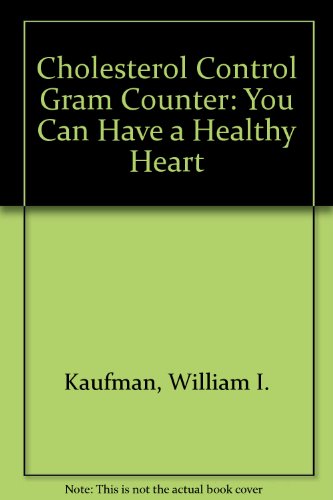cholesterol control gram counter de kaufman william (2 resultados)
Tipo de artículo
- Todos los tipos de productos
- Libros (2)
- Revistas y publicaciones
- Cómics
- Partituras
- Arte, grabados y pósters
- Fotografías
- Mapas
- Manuscritos y coleccionismo de papel
Condición
Encuadernación
- Todas
- Tapa dura
- Tapa blanda (2)
Más atributos
- Primera edición
- Firmado
- Sobrecubierta
- Con imágenes
- No impresión bajo demanda (2)
Gastos de envío gratis
- Gastos de Envío Gratis a EEUU
Ubicación del vendedor
Valoración de los vendedores
-
Cholesterol Control Gram Counter
Publicado por Jove Books, 1987
ISBN 10: 0515092487ISBN 13: 9780515092486
Librería: Books for a Cause, Rochester, NY, Estados Unidos de America
Libro
Soft cover. Condición: Good. This book has wear along the edges of its covers, especially on the lower edge of the back cover. There is a name and date written at the top of the title page.
-
Cholesterol Control Gram Counter; You Can Have A Healthy Heart
Publicado por Jove Books, New York, 1987
ISBN 10: 0515092487ISBN 13: 9780515092486
Librería: Ground Zero Books, Ltd., Silver Spring, MD, Estados Unidos de America
Libro
Wraps. Condición: Good. Fifth Printing [Stated]. The format is approximately 3.375 inches by 6.5 inches. 80 pages. Bibliography. William I. Kaufman was a food and wine connoisseur and former television producer and director who wrote some 150 books about those and other subjects. Mr. Kaufman signed up with the fledgling NBC network in 1947 and worked for 15 years in the new medium as a director, producer, casting director and sales director. He also began editing books advising aspiring directors, writers and announcers on careers in television. His first epicurean work was "Cooking With the Experts" (Random House, 1955), a collection of 400 recipes from television cooks. After leaving NBC in 1963, he worked as a freelance writer, editor and photographer and began to write more frequently about food, including ethnic cuisines and dietary and natural-foods cooking. Cholesterol is the principal sterol of all higher animals, distributed in body tissues, especially the brain and spinal cord, and in animal fats and oils. Cholesterol is biosynthesized by all animal cells and is an essential structural component of animal cell membranes. In vertebrates, hepatic cells typically produce the greatest amounts. In the brain, astrocytes produce cholesterol and transport it to neurons. It is absent among prokaryotes (bacteria and archaea), although there are some exceptions, such as Mycoplasma, which require cholesterol for growth. Cholesterol also serves as a precursor for the biosynthesis of steroid hormones, bile acid and vitamin D. Elevated levels of cholesterol in the blood, especially when bound to low-density lipoprotein (LDL, often referred to as "bad cholesterol"), may increase the risk of cardiovascular disease. François Poulletier de la Salle first identified cholesterol in solid form in gallstones in 1769. In 1815, chemist Michel Eugène Chevreul named the compound "cholesterine". In 2015, the scientific advisory panel of U.S. Department of Health and Human Services and U.S. Department of Agriculture for the 2015 iteration of the Dietary Guidelines for Americans dropped the previously recommended limit of consumption of dietary cholesterol to 300 mg per day with a new recommendation to "eat as little dietary cholesterol as possible" and acknowledging an association between a diet low in cholesterol and reduced risk of cardiovascular disease. A 2013 report by the American Heart Association and the American College of Cardiology recommended focusing on healthy dietary patterns rather than specific cholesterol limits, as they are hard for clinicians and consumers to implement. They recommend the DASH and Mediterranean diet, which are low in cholesterol. A 2017 review by the American Heart Association recommends switching saturated fats for polyunsaturated fats to reduce cardiovascular disease risk.


